Christian Perspectives on Spirituality, Ethics, and Scientism in Care
VerifiedAdded on 2022/12/28
|9
|2224
|52
Essay
AI Summary
This essay delves into the Christian perspective on spirituality and ethics in healthcare, contrasting it with postmodern relativism. It defines Christian spirituality as a process of spiritual development aligned with Christian life expectancy, emphasizing the integration of Christian beliefs and the experience of God's presence. The essay addresses scientism, defining it as the application of the scientific method to all questions, including those of value and existence. Arguments against scientism are presented, including its self-defeating nature and its inability to provide a complete explanation of reality. Furthermore, the essay explores concepts such as ultimate reality, the nature of the universe, the definition of a human being, the meaning of knowledge, the basis of ethics, and the purpose of existence from both Christian and scientific viewpoints. The author concludes by reflecting on the influence of religious beliefs and ethical backgrounds on individual ethics and decision-making.
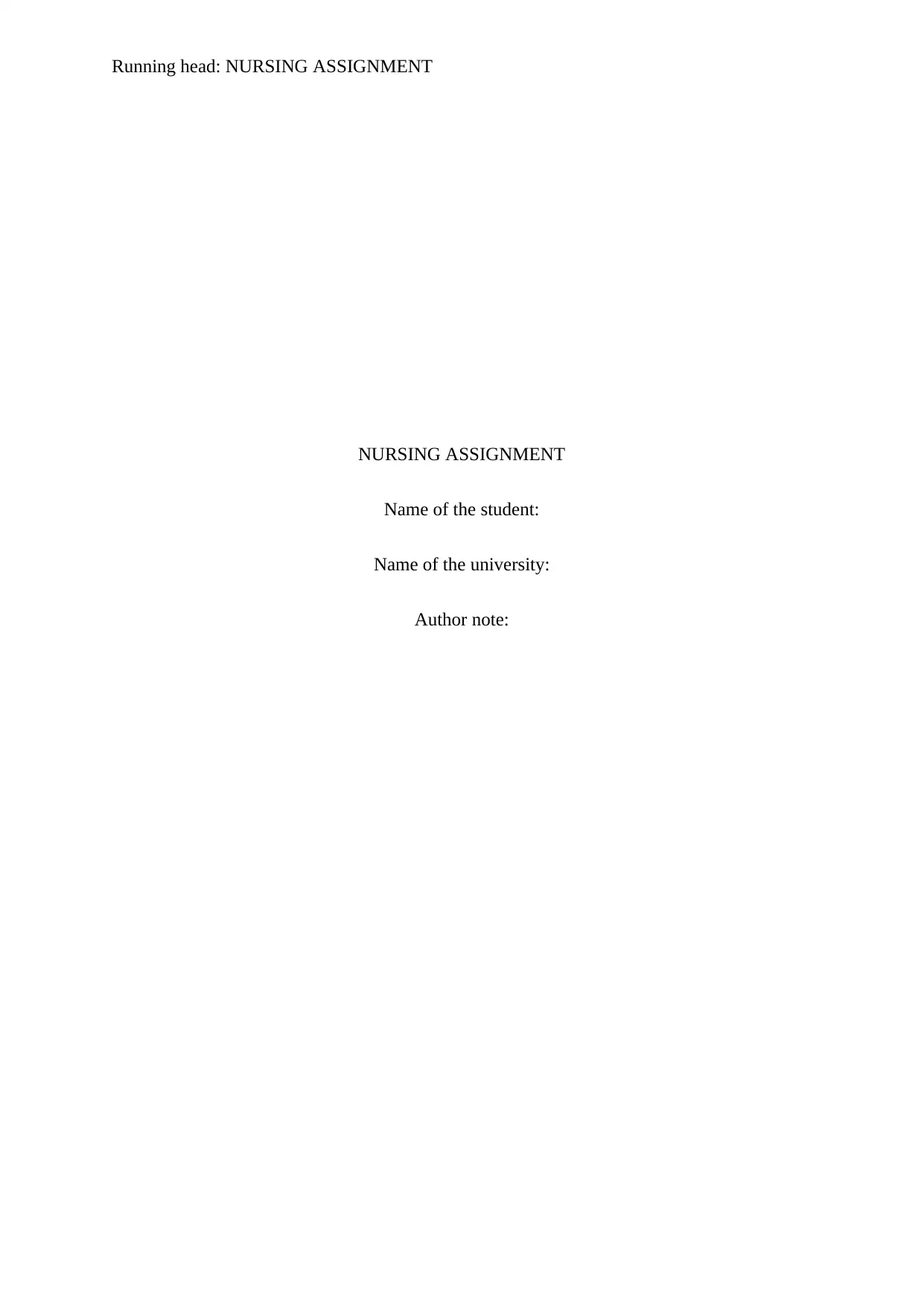
Running head: NURSING ASSIGNMENT
NURSING ASSIGNMENT
Name of the student:
Name of the university:
Author note:
NURSING ASSIGNMENT
Name of the student:
Name of the university:
Author note:
Paraphrase This Document
Need a fresh take? Get an instant paraphrase of this document with our AI Paraphraser
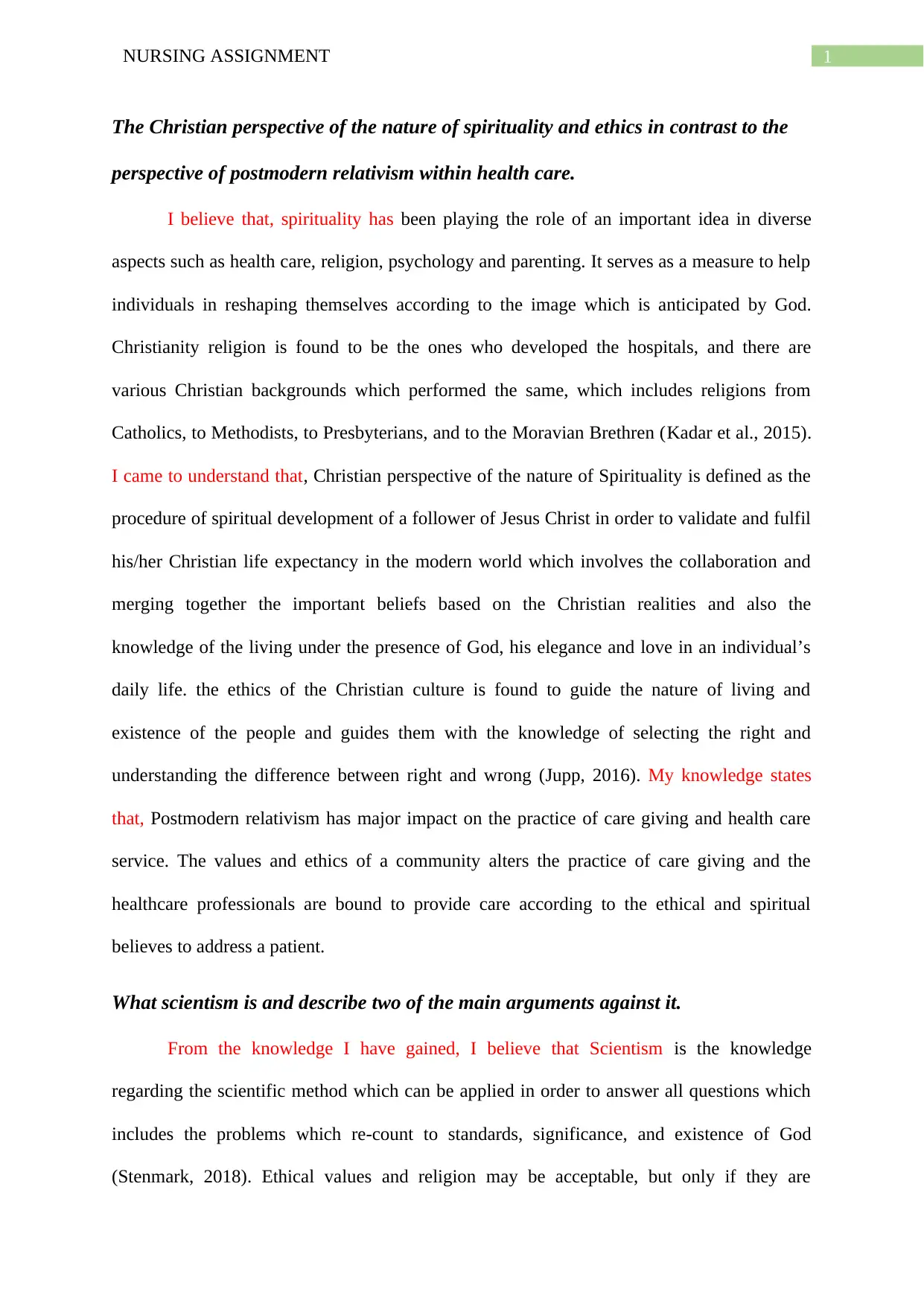
1NURSING ASSIGNMENT
The Christian perspective of the nature of spirituality and ethics in contrast to the
perspective of postmodern relativism within health care.
I believe that, spirituality has been playing the role of an important idea in diverse
aspects such as health care, religion, psychology and parenting. It serves as a measure to help
individuals in reshaping themselves according to the image which is anticipated by God.
Christianity religion is found to be the ones who developed the hospitals, and there are
various Christian backgrounds which performed the same, which includes religions from
Catholics, to Methodists, to Presbyterians, and to the Moravian Brethren (Kadar et al., 2015).
I came to understand that, Christian perspective of the nature of Spirituality is defined as the
procedure of spiritual development of a follower of Jesus Christ in order to validate and fulfil
his/her Christian life expectancy in the modern world which involves the collaboration and
merging together the important beliefs based on the Christian realities and also the
knowledge of the living under the presence of God, his elegance and love in an individual’s
daily life. the ethics of the Christian culture is found to guide the nature of living and
existence of the people and guides them with the knowledge of selecting the right and
understanding the difference between right and wrong (Jupp, 2016). My knowledge states
that, Postmodern relativism has major impact on the practice of care giving and health care
service. The values and ethics of a community alters the practice of care giving and the
healthcare professionals are bound to provide care according to the ethical and spiritual
believes to address a patient.
What scientism is and describe two of the main arguments against it.
From the knowledge I have gained, I believe that Scientism is the knowledge
regarding the scientific method which can be applied in order to answer all questions which
includes the problems which re-count to standards, significance, and existence of God
(Stenmark, 2018). Ethical values and religion may be acceptable, but only if they are
The Christian perspective of the nature of spirituality and ethics in contrast to the
perspective of postmodern relativism within health care.
I believe that, spirituality has been playing the role of an important idea in diverse
aspects such as health care, religion, psychology and parenting. It serves as a measure to help
individuals in reshaping themselves according to the image which is anticipated by God.
Christianity religion is found to be the ones who developed the hospitals, and there are
various Christian backgrounds which performed the same, which includes religions from
Catholics, to Methodists, to Presbyterians, and to the Moravian Brethren (Kadar et al., 2015).
I came to understand that, Christian perspective of the nature of Spirituality is defined as the
procedure of spiritual development of a follower of Jesus Christ in order to validate and fulfil
his/her Christian life expectancy in the modern world which involves the collaboration and
merging together the important beliefs based on the Christian realities and also the
knowledge of the living under the presence of God, his elegance and love in an individual’s
daily life. the ethics of the Christian culture is found to guide the nature of living and
existence of the people and guides them with the knowledge of selecting the right and
understanding the difference between right and wrong (Jupp, 2016). My knowledge states
that, Postmodern relativism has major impact on the practice of care giving and health care
service. The values and ethics of a community alters the practice of care giving and the
healthcare professionals are bound to provide care according to the ethical and spiritual
believes to address a patient.
What scientism is and describe two of the main arguments against it.
From the knowledge I have gained, I believe that Scientism is the knowledge
regarding the scientific method which can be applied in order to answer all questions which
includes the problems which re-count to standards, significance, and existence of God
(Stenmark, 2018). Ethical values and religion may be acceptable, but only if they are
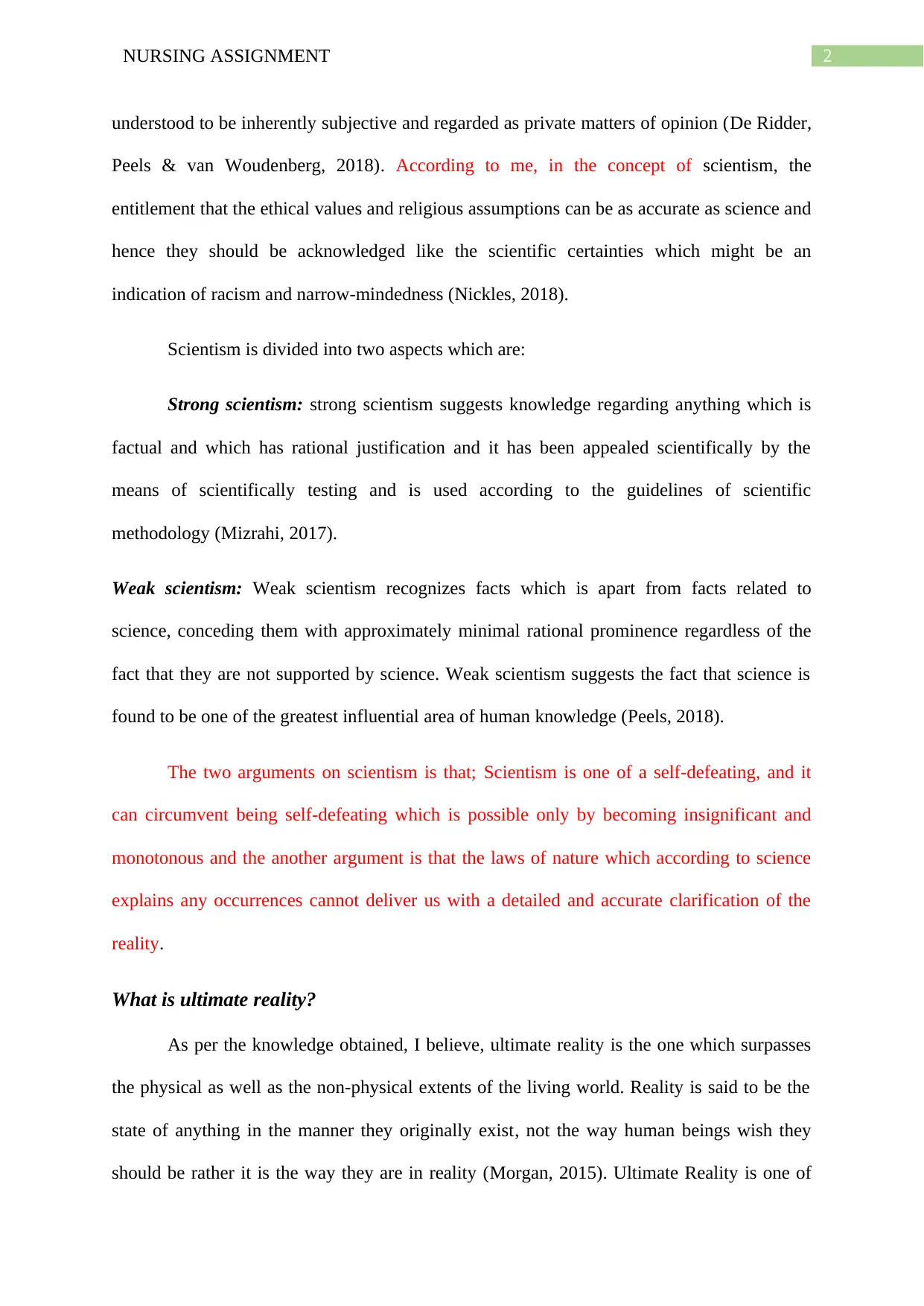
2NURSING ASSIGNMENT
understood to be inherently subjective and regarded as private matters of opinion (De Ridder,
Peels & van Woudenberg, 2018). According to me, in the concept of scientism, the
entitlement that the ethical values and religious assumptions can be as accurate as science and
hence they should be acknowledged like the scientific certainties which might be an
indication of racism and narrow-mindedness (Nickles, 2018).
Scientism is divided into two aspects which are:
Strong scientism: strong scientism suggests knowledge regarding anything which is
factual and which has rational justification and it has been appealed scientifically by the
means of scientifically testing and is used according to the guidelines of scientific
methodology (Mizrahi, 2017).
Weak scientism: Weak scientism recognizes facts which is apart from facts related to
science, conceding them with approximately minimal rational prominence regardless of the
fact that they are not supported by science. Weak scientism suggests the fact that science is
found to be one of the greatest influential area of human knowledge (Peels, 2018).
The two arguments on scientism is that; Scientism is one of a self-defeating, and it
can circumvent being self-defeating which is possible only by becoming insignificant and
monotonous and the another argument is that the laws of nature which according to science
explains any occurrences cannot deliver us with a detailed and accurate clarification of the
reality.
What is ultimate reality?
As per the knowledge obtained, I believe, ultimate reality is the one which surpasses
the physical as well as the non-physical extents of the living world. Reality is said to be the
state of anything in the manner they originally exist, not the way human beings wish they
should be rather it is the way they are in reality (Morgan, 2015). Ultimate Reality is one of
understood to be inherently subjective and regarded as private matters of opinion (De Ridder,
Peels & van Woudenberg, 2018). According to me, in the concept of scientism, the
entitlement that the ethical values and religious assumptions can be as accurate as science and
hence they should be acknowledged like the scientific certainties which might be an
indication of racism and narrow-mindedness (Nickles, 2018).
Scientism is divided into two aspects which are:
Strong scientism: strong scientism suggests knowledge regarding anything which is
factual and which has rational justification and it has been appealed scientifically by the
means of scientifically testing and is used according to the guidelines of scientific
methodology (Mizrahi, 2017).
Weak scientism: Weak scientism recognizes facts which is apart from facts related to
science, conceding them with approximately minimal rational prominence regardless of the
fact that they are not supported by science. Weak scientism suggests the fact that science is
found to be one of the greatest influential area of human knowledge (Peels, 2018).
The two arguments on scientism is that; Scientism is one of a self-defeating, and it
can circumvent being self-defeating which is possible only by becoming insignificant and
monotonous and the another argument is that the laws of nature which according to science
explains any occurrences cannot deliver us with a detailed and accurate clarification of the
reality.
What is ultimate reality?
As per the knowledge obtained, I believe, ultimate reality is the one which surpasses
the physical as well as the non-physical extents of the living world. Reality is said to be the
state of anything in the manner they originally exist, not the way human beings wish they
should be rather it is the way they are in reality (Morgan, 2015). Ultimate Reality is one of
⊘ This is a preview!⊘
Do you want full access?
Subscribe today to unlock all pages.

Trusted by 1+ million students worldwide
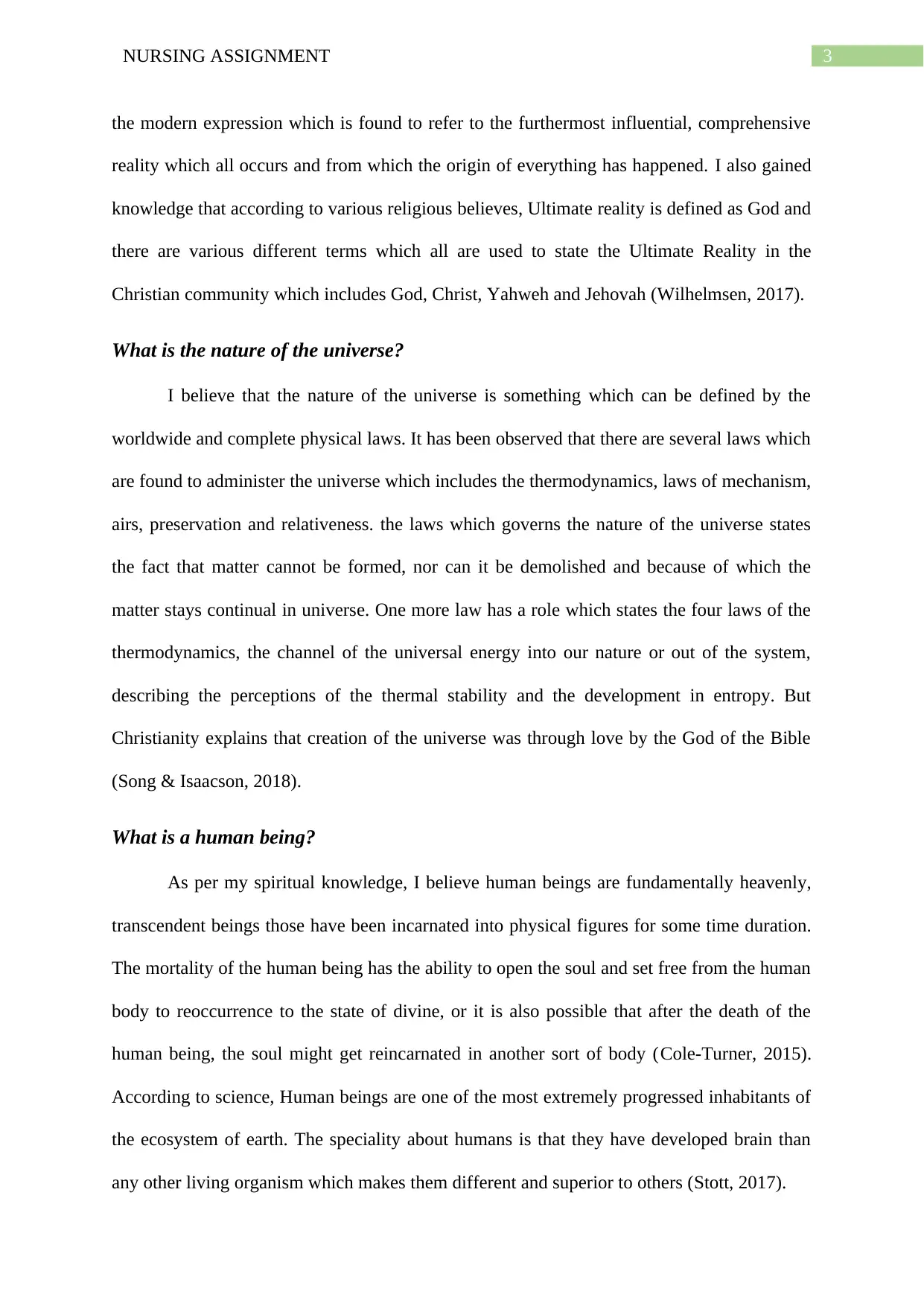
3NURSING ASSIGNMENT
the modern expression which is found to refer to the furthermost influential, comprehensive
reality which all occurs and from which the origin of everything has happened. I also gained
knowledge that according to various religious believes, Ultimate reality is defined as God and
there are various different terms which all are used to state the Ultimate Reality in the
Christian community which includes God, Christ, Yahweh and Jehovah (Wilhelmsen, 2017).
What is the nature of the universe?
I believe that the nature of the universe is something which can be defined by the
worldwide and complete physical laws. It has been observed that there are several laws which
are found to administer the universe which includes the thermodynamics, laws of mechanism,
airs, preservation and relativeness. the laws which governs the nature of the universe states
the fact that matter cannot be formed, nor can it be demolished and because of which the
matter stays continual in universe. One more law has a role which states the four laws of the
thermodynamics, the channel of the universal energy into our nature or out of the system,
describing the perceptions of the thermal stability and the development in entropy. But
Christianity explains that creation of the universe was through love by the God of the Bible
(Song & Isaacson, 2018).
What is a human being?
As per my spiritual knowledge, I believe human beings are fundamentally heavenly,
transcendent beings those have been incarnated into physical figures for some time duration.
The mortality of the human being has the ability to open the soul and set free from the human
body to reoccurrence to the state of divine, or it is also possible that after the death of the
human being, the soul might get reincarnated in another sort of body (Cole-Turner, 2015).
According to science, Human beings are one of the most extremely progressed inhabitants of
the ecosystem of earth. The speciality about humans is that they have developed brain than
any other living organism which makes them different and superior to others (Stott, 2017).
the modern expression which is found to refer to the furthermost influential, comprehensive
reality which all occurs and from which the origin of everything has happened. I also gained
knowledge that according to various religious believes, Ultimate reality is defined as God and
there are various different terms which all are used to state the Ultimate Reality in the
Christian community which includes God, Christ, Yahweh and Jehovah (Wilhelmsen, 2017).
What is the nature of the universe?
I believe that the nature of the universe is something which can be defined by the
worldwide and complete physical laws. It has been observed that there are several laws which
are found to administer the universe which includes the thermodynamics, laws of mechanism,
airs, preservation and relativeness. the laws which governs the nature of the universe states
the fact that matter cannot be formed, nor can it be demolished and because of which the
matter stays continual in universe. One more law has a role which states the four laws of the
thermodynamics, the channel of the universal energy into our nature or out of the system,
describing the perceptions of the thermal stability and the development in entropy. But
Christianity explains that creation of the universe was through love by the God of the Bible
(Song & Isaacson, 2018).
What is a human being?
As per my spiritual knowledge, I believe human beings are fundamentally heavenly,
transcendent beings those have been incarnated into physical figures for some time duration.
The mortality of the human being has the ability to open the soul and set free from the human
body to reoccurrence to the state of divine, or it is also possible that after the death of the
human being, the soul might get reincarnated in another sort of body (Cole-Turner, 2015).
According to science, Human beings are one of the most extremely progressed inhabitants of
the ecosystem of earth. The speciality about humans is that they have developed brain than
any other living organism which makes them different and superior to others (Stott, 2017).
Paraphrase This Document
Need a fresh take? Get an instant paraphrase of this document with our AI Paraphraser
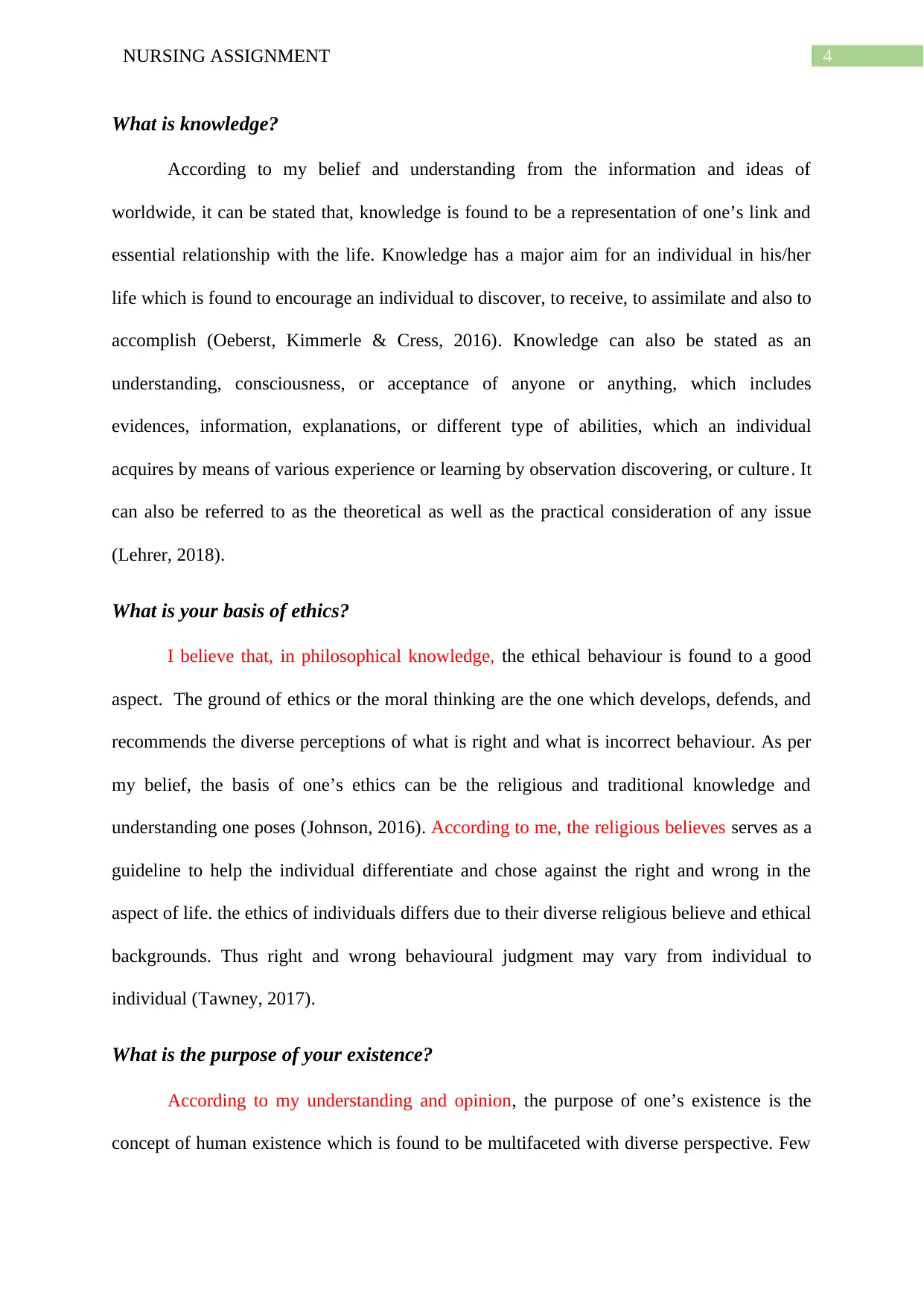
4NURSING ASSIGNMENT
What is knowledge?
According to my belief and understanding from the information and ideas of
worldwide, it can be stated that, knowledge is found to be a representation of one’s link and
essential relationship with the life. Knowledge has a major aim for an individual in his/her
life which is found to encourage an individual to discover, to receive, to assimilate and also to
accomplish (Oeberst, Kimmerle & Cress, 2016). Knowledge can also be stated as an
understanding, consciousness, or acceptance of anyone or anything, which includes
evidences, information, explanations, or different type of abilities, which an individual
acquires by means of various experience or learning by observation discovering, or culture. It
can also be referred to as the theoretical as well as the practical consideration of any issue
(Lehrer, 2018).
What is your basis of ethics?
I believe that, in philosophical knowledge, the ethical behaviour is found to a good
aspect. The ground of ethics or the moral thinking are the one which develops, defends, and
recommends the diverse perceptions of what is right and what is incorrect behaviour. As per
my belief, the basis of one’s ethics can be the religious and traditional knowledge and
understanding one poses (Johnson, 2016). According to me, the religious believes serves as a
guideline to help the individual differentiate and chose against the right and wrong in the
aspect of life. the ethics of individuals differs due to their diverse religious believe and ethical
backgrounds. Thus right and wrong behavioural judgment may vary from individual to
individual (Tawney, 2017).
What is the purpose of your existence?
According to my understanding and opinion, the purpose of one’s existence is the
concept of human existence which is found to be multifaceted with diverse perspective. Few
What is knowledge?
According to my belief and understanding from the information and ideas of
worldwide, it can be stated that, knowledge is found to be a representation of one’s link and
essential relationship with the life. Knowledge has a major aim for an individual in his/her
life which is found to encourage an individual to discover, to receive, to assimilate and also to
accomplish (Oeberst, Kimmerle & Cress, 2016). Knowledge can also be stated as an
understanding, consciousness, or acceptance of anyone or anything, which includes
evidences, information, explanations, or different type of abilities, which an individual
acquires by means of various experience or learning by observation discovering, or culture. It
can also be referred to as the theoretical as well as the practical consideration of any issue
(Lehrer, 2018).
What is your basis of ethics?
I believe that, in philosophical knowledge, the ethical behaviour is found to a good
aspect. The ground of ethics or the moral thinking are the one which develops, defends, and
recommends the diverse perceptions of what is right and what is incorrect behaviour. As per
my belief, the basis of one’s ethics can be the religious and traditional knowledge and
understanding one poses (Johnson, 2016). According to me, the religious believes serves as a
guideline to help the individual differentiate and chose against the right and wrong in the
aspect of life. the ethics of individuals differs due to their diverse religious believe and ethical
backgrounds. Thus right and wrong behavioural judgment may vary from individual to
individual (Tawney, 2017).
What is the purpose of your existence?
According to my understanding and opinion, the purpose of one’s existence is the
concept of human existence which is found to be multifaceted with diverse perspective. Few
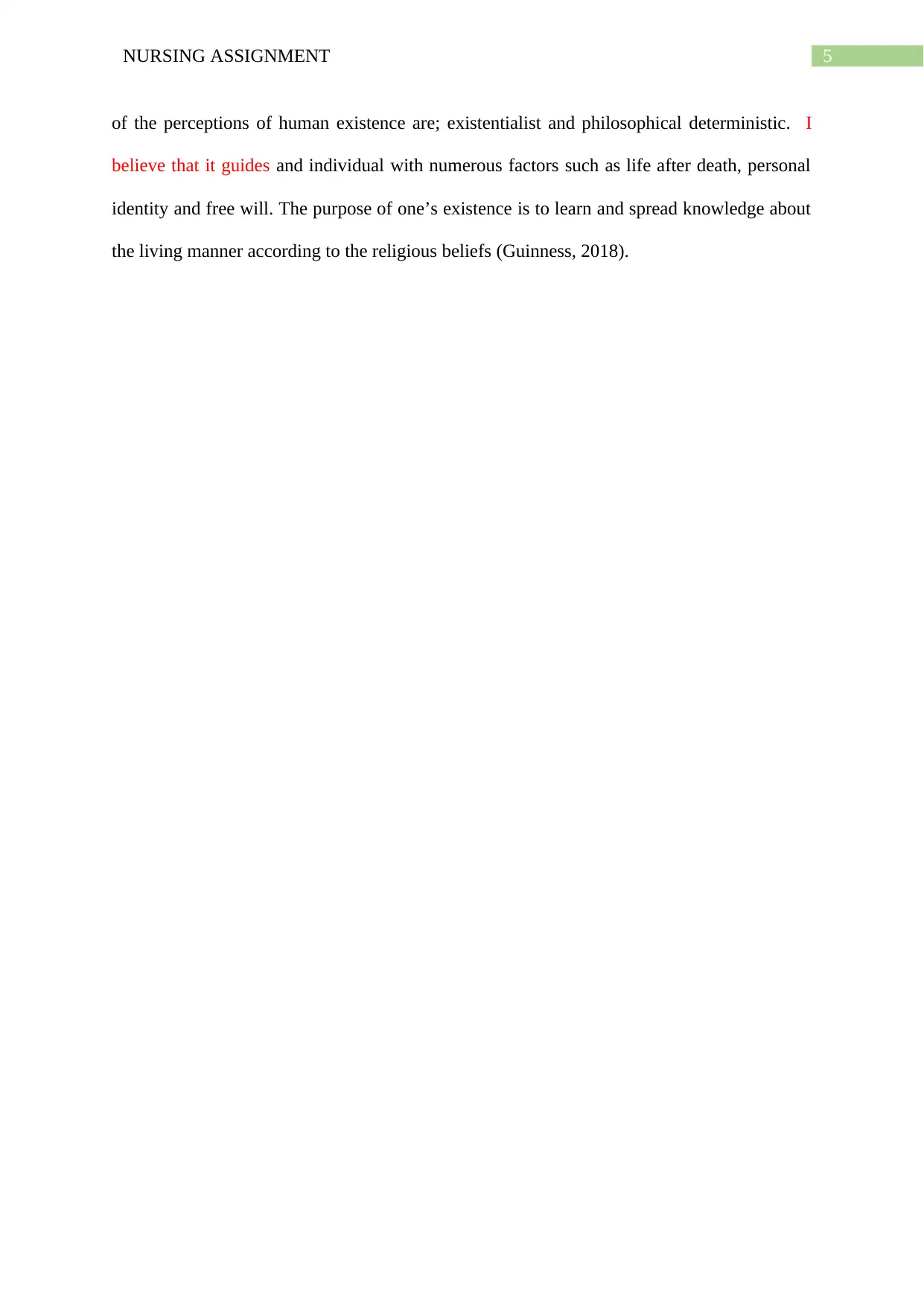
5NURSING ASSIGNMENT
of the perceptions of human existence are; existentialist and philosophical deterministic. I
believe that it guides and individual with numerous factors such as life after death, personal
identity and free will. The purpose of one’s existence is to learn and spread knowledge about
the living manner according to the religious beliefs (Guinness, 2018).
of the perceptions of human existence are; existentialist and philosophical deterministic. I
believe that it guides and individual with numerous factors such as life after death, personal
identity and free will. The purpose of one’s existence is to learn and spread knowledge about
the living manner according to the religious beliefs (Guinness, 2018).
⊘ This is a preview!⊘
Do you want full access?
Subscribe today to unlock all pages.

Trusted by 1+ million students worldwide
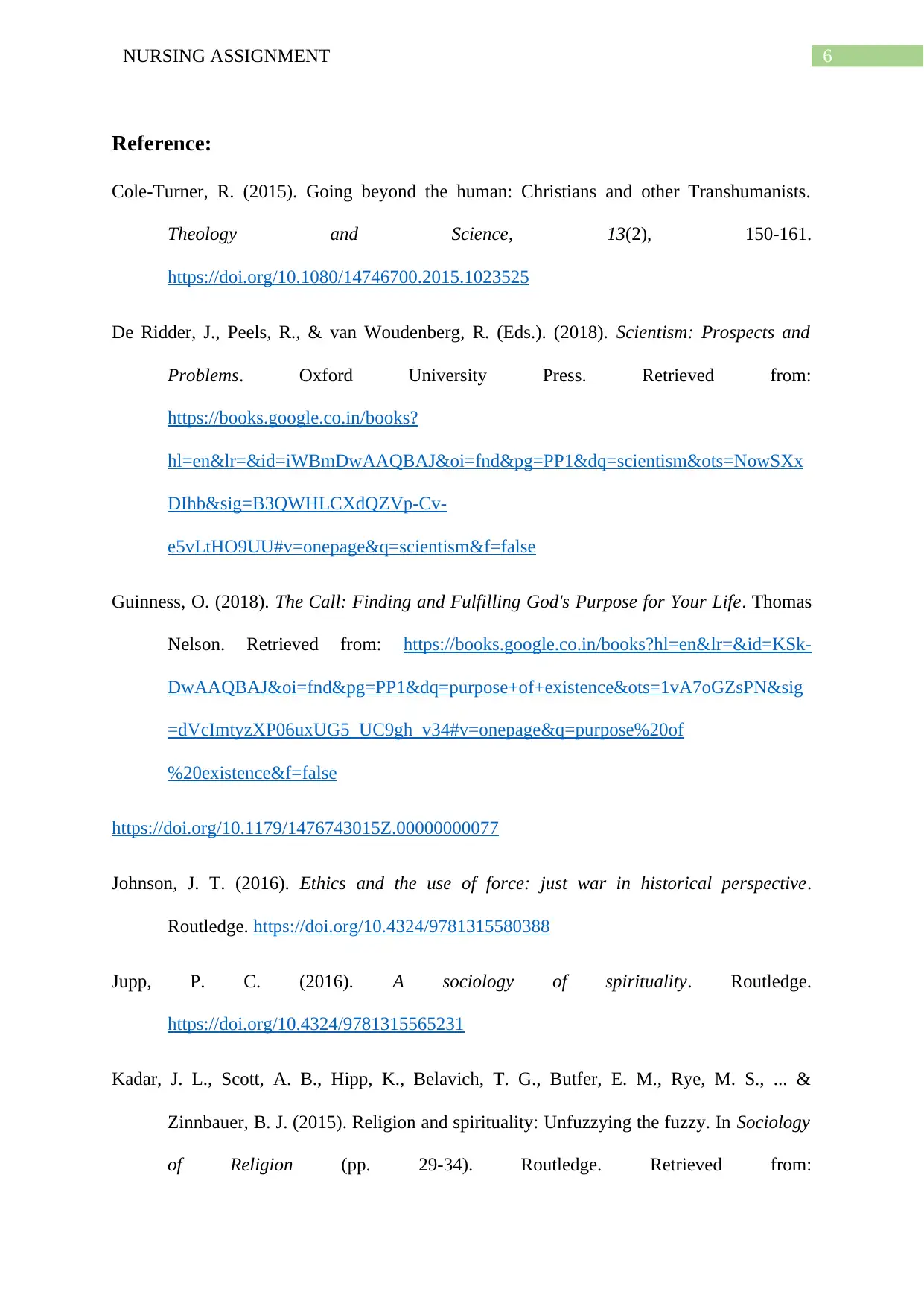
6NURSING ASSIGNMENT
Reference:
Cole-Turner, R. (2015). Going beyond the human: Christians and other Transhumanists.
Theology and Science, 13(2), 150-161.
https://doi.org/10.1080/14746700.2015.1023525
De Ridder, J., Peels, R., & van Woudenberg, R. (Eds.). (2018). Scientism: Prospects and
Problems. Oxford University Press. Retrieved from:
https://books.google.co.in/books?
hl=en&lr=&id=iWBmDwAAQBAJ&oi=fnd&pg=PP1&dq=scientism&ots=NowSXx
DIhb&sig=B3QWHLCXdQZVp-Cv-
e5vLtHO9UU#v=onepage&q=scientism&f=false
Guinness, O. (2018). The Call: Finding and Fulfilling God's Purpose for Your Life. Thomas
Nelson. Retrieved from: https://books.google.co.in/books?hl=en&lr=&id=KSk-
DwAAQBAJ&oi=fnd&pg=PP1&dq=purpose+of+existence&ots=1vA7oGZsPN&sig
=dVcImtyzXP06uxUG5_UC9gh_v34#v=onepage&q=purpose%20of
%20existence&f=false
https://doi.org/10.1179/1476743015Z.00000000077
Johnson, J. T. (2016). Ethics and the use of force: just war in historical perspective.
Routledge. https://doi.org/10.4324/9781315580388
Jupp, P. C. (2016). A sociology of spirituality. Routledge.
https://doi.org/10.4324/9781315565231
Kadar, J. L., Scott, A. B., Hipp, K., Belavich, T. G., Butfer, E. M., Rye, M. S., ... &
Zinnbauer, B. J. (2015). Religion and spirituality: Unfuzzying the fuzzy. In Sociology
of Religion (pp. 29-34). Routledge. Retrieved from:
Reference:
Cole-Turner, R. (2015). Going beyond the human: Christians and other Transhumanists.
Theology and Science, 13(2), 150-161.
https://doi.org/10.1080/14746700.2015.1023525
De Ridder, J., Peels, R., & van Woudenberg, R. (Eds.). (2018). Scientism: Prospects and
Problems. Oxford University Press. Retrieved from:
https://books.google.co.in/books?
hl=en&lr=&id=iWBmDwAAQBAJ&oi=fnd&pg=PP1&dq=scientism&ots=NowSXx
DIhb&sig=B3QWHLCXdQZVp-Cv-
e5vLtHO9UU#v=onepage&q=scientism&f=false
Guinness, O. (2018). The Call: Finding and Fulfilling God's Purpose for Your Life. Thomas
Nelson. Retrieved from: https://books.google.co.in/books?hl=en&lr=&id=KSk-
DwAAQBAJ&oi=fnd&pg=PP1&dq=purpose+of+existence&ots=1vA7oGZsPN&sig
=dVcImtyzXP06uxUG5_UC9gh_v34#v=onepage&q=purpose%20of
%20existence&f=false
https://doi.org/10.1179/1476743015Z.00000000077
Johnson, J. T. (2016). Ethics and the use of force: just war in historical perspective.
Routledge. https://doi.org/10.4324/9781315580388
Jupp, P. C. (2016). A sociology of spirituality. Routledge.
https://doi.org/10.4324/9781315565231
Kadar, J. L., Scott, A. B., Hipp, K., Belavich, T. G., Butfer, E. M., Rye, M. S., ... &
Zinnbauer, B. J. (2015). Religion and spirituality: Unfuzzying the fuzzy. In Sociology
of Religion (pp. 29-34). Routledge. Retrieved from:
Paraphrase This Document
Need a fresh take? Get an instant paraphrase of this document with our AI Paraphraser
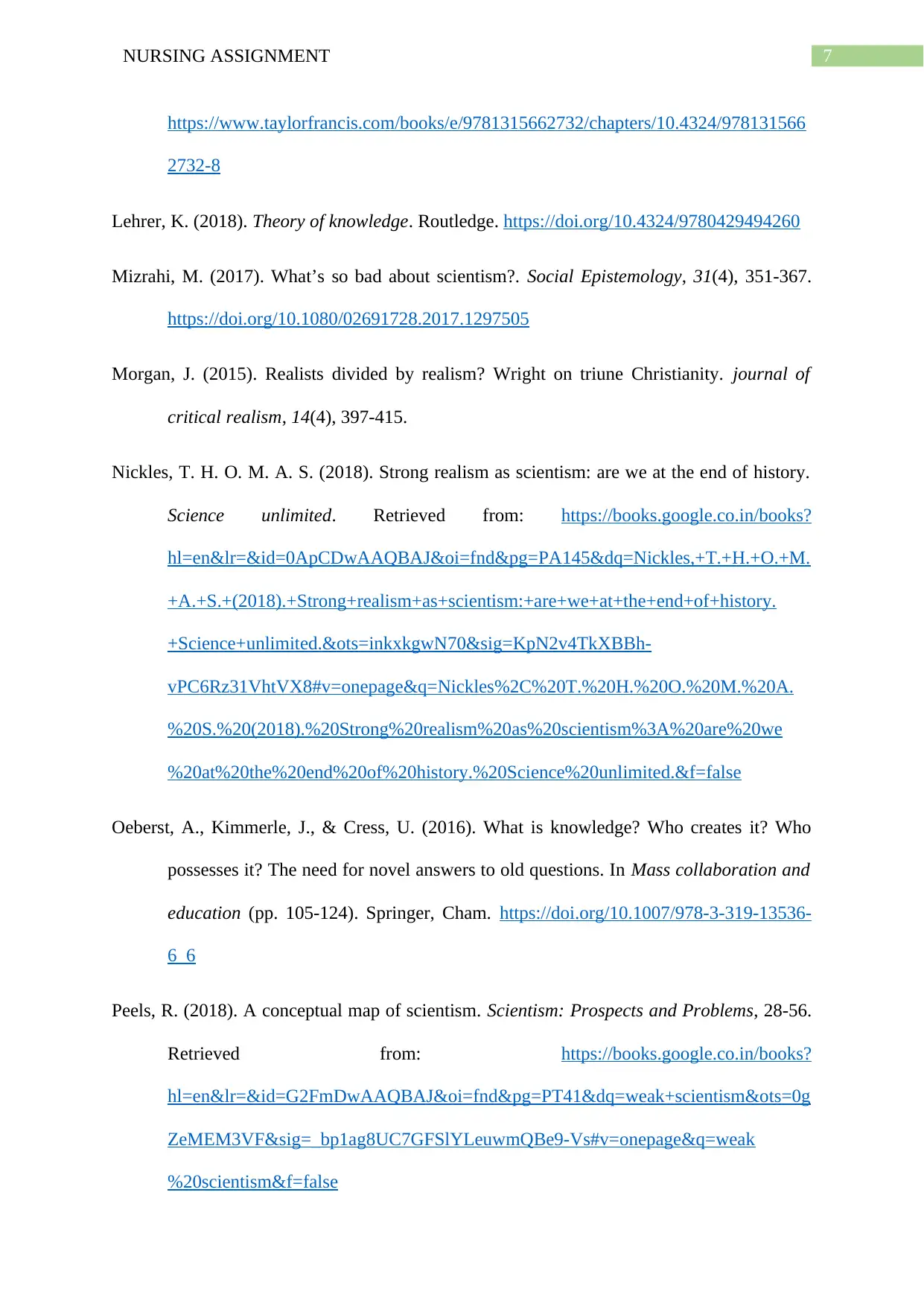
7NURSING ASSIGNMENT
https://www.taylorfrancis.com/books/e/9781315662732/chapters/10.4324/978131566
2732-8
Lehrer, K. (2018). Theory of knowledge. Routledge. https://doi.org/10.4324/9780429494260
Mizrahi, M. (2017). What’s so bad about scientism?. Social Epistemology, 31(4), 351-367.
https://doi.org/10.1080/02691728.2017.1297505
Morgan, J. (2015). Realists divided by realism? Wright on triune Christianity. journal of
critical realism, 14(4), 397-415.
Nickles, T. H. O. M. A. S. (2018). Strong realism as scientism: are we at the end of history.
Science unlimited. Retrieved from: https://books.google.co.in/books?
hl=en&lr=&id=0ApCDwAAQBAJ&oi=fnd&pg=PA145&dq=Nickles,+T.+H.+O.+M.
+A.+S.+(2018).+Strong+realism+as+scientism:+are+we+at+the+end+of+history.
+Science+unlimited.&ots=inkxkgwN70&sig=KpN2v4TkXBBh-
vPC6Rz31VhtVX8#v=onepage&q=Nickles%2C%20T.%20H.%20O.%20M.%20A.
%20S.%20(2018).%20Strong%20realism%20as%20scientism%3A%20are%20we
%20at%20the%20end%20of%20history.%20Science%20unlimited.&f=false
Oeberst, A., Kimmerle, J., & Cress, U. (2016). What is knowledge? Who creates it? Who
possesses it? The need for novel answers to old questions. In Mass collaboration and
education (pp. 105-124). Springer, Cham. https://doi.org/10.1007/978-3-319-13536-
6_6
Peels, R. (2018). A conceptual map of scientism. Scientism: Prospects and Problems, 28-56.
Retrieved from: https://books.google.co.in/books?
hl=en&lr=&id=G2FmDwAAQBAJ&oi=fnd&pg=PT41&dq=weak+scientism&ots=0g
ZeMEM3VF&sig=_bp1ag8UC7GFSlYLeuwmQBe9-Vs#v=onepage&q=weak
%20scientism&f=false
https://www.taylorfrancis.com/books/e/9781315662732/chapters/10.4324/978131566
2732-8
Lehrer, K. (2018). Theory of knowledge. Routledge. https://doi.org/10.4324/9780429494260
Mizrahi, M. (2017). What’s so bad about scientism?. Social Epistemology, 31(4), 351-367.
https://doi.org/10.1080/02691728.2017.1297505
Morgan, J. (2015). Realists divided by realism? Wright on triune Christianity. journal of
critical realism, 14(4), 397-415.
Nickles, T. H. O. M. A. S. (2018). Strong realism as scientism: are we at the end of history.
Science unlimited. Retrieved from: https://books.google.co.in/books?
hl=en&lr=&id=0ApCDwAAQBAJ&oi=fnd&pg=PA145&dq=Nickles,+T.+H.+O.+M.
+A.+S.+(2018).+Strong+realism+as+scientism:+are+we+at+the+end+of+history.
+Science+unlimited.&ots=inkxkgwN70&sig=KpN2v4TkXBBh-
vPC6Rz31VhtVX8#v=onepage&q=Nickles%2C%20T.%20H.%20O.%20M.%20A.
%20S.%20(2018).%20Strong%20realism%20as%20scientism%3A%20are%20we
%20at%20the%20end%20of%20history.%20Science%20unlimited.&f=false
Oeberst, A., Kimmerle, J., & Cress, U. (2016). What is knowledge? Who creates it? Who
possesses it? The need for novel answers to old questions. In Mass collaboration and
education (pp. 105-124). Springer, Cham. https://doi.org/10.1007/978-3-319-13536-
6_6
Peels, R. (2018). A conceptual map of scientism. Scientism: Prospects and Problems, 28-56.
Retrieved from: https://books.google.co.in/books?
hl=en&lr=&id=G2FmDwAAQBAJ&oi=fnd&pg=PT41&dq=weak+scientism&ots=0g
ZeMEM3VF&sig=_bp1ag8UC7GFSlYLeuwmQBe9-Vs#v=onepage&q=weak
%20scientism&f=false
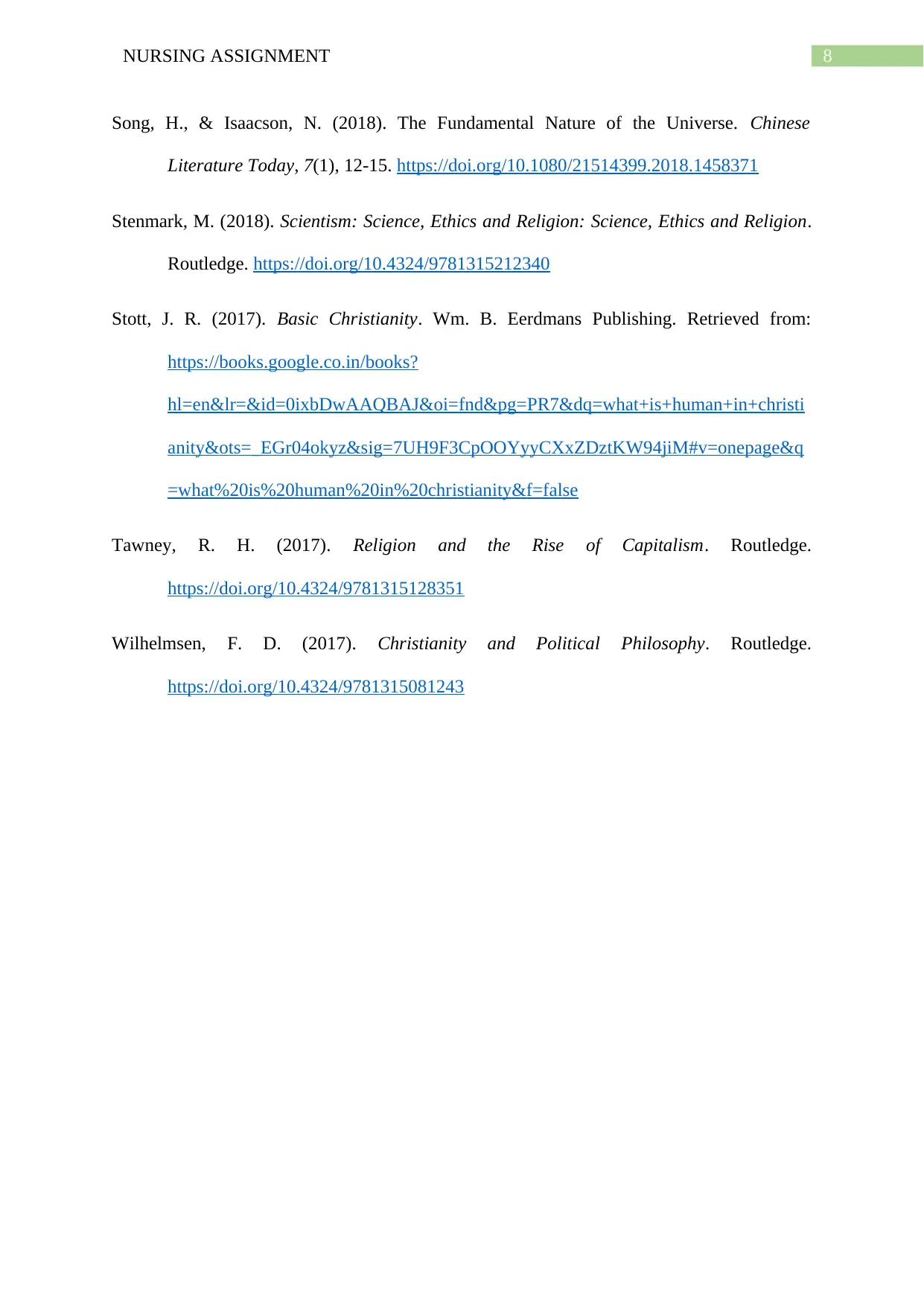
8NURSING ASSIGNMENT
Song, H., & Isaacson, N. (2018). The Fundamental Nature of the Universe. Chinese
Literature Today, 7(1), 12-15. https://doi.org/10.1080/21514399.2018.1458371
Stenmark, M. (2018). Scientism: Science, Ethics and Religion: Science, Ethics and Religion.
Routledge. https://doi.org/10.4324/9781315212340
Stott, J. R. (2017). Basic Christianity. Wm. B. Eerdmans Publishing. Retrieved from:
https://books.google.co.in/books?
hl=en&lr=&id=0ixbDwAAQBAJ&oi=fnd&pg=PR7&dq=what+is+human+in+christi
anity&ots=_EGr04okyz&sig=7UH9F3CpOOYyyCXxZDztKW94jiM#v=onepage&q
=what%20is%20human%20in%20christianity&f=false
Tawney, R. H. (2017). Religion and the Rise of Capitalism. Routledge.
https://doi.org/10.4324/9781315128351
Wilhelmsen, F. D. (2017). Christianity and Political Philosophy. Routledge.
https://doi.org/10.4324/9781315081243
Song, H., & Isaacson, N. (2018). The Fundamental Nature of the Universe. Chinese
Literature Today, 7(1), 12-15. https://doi.org/10.1080/21514399.2018.1458371
Stenmark, M. (2018). Scientism: Science, Ethics and Religion: Science, Ethics and Religion.
Routledge. https://doi.org/10.4324/9781315212340
Stott, J. R. (2017). Basic Christianity. Wm. B. Eerdmans Publishing. Retrieved from:
https://books.google.co.in/books?
hl=en&lr=&id=0ixbDwAAQBAJ&oi=fnd&pg=PR7&dq=what+is+human+in+christi
anity&ots=_EGr04okyz&sig=7UH9F3CpOOYyyCXxZDztKW94jiM#v=onepage&q
=what%20is%20human%20in%20christianity&f=false
Tawney, R. H. (2017). Religion and the Rise of Capitalism. Routledge.
https://doi.org/10.4324/9781315128351
Wilhelmsen, F. D. (2017). Christianity and Political Philosophy. Routledge.
https://doi.org/10.4324/9781315081243
⊘ This is a preview!⊘
Do you want full access?
Subscribe today to unlock all pages.

Trusted by 1+ million students worldwide
1 out of 9
Related Documents
Your All-in-One AI-Powered Toolkit for Academic Success.
+13062052269
info@desklib.com
Available 24*7 on WhatsApp / Email
![[object Object]](/_next/static/media/star-bottom.7253800d.svg)
Unlock your academic potential
Copyright © 2020–2026 A2Z Services. All Rights Reserved. Developed and managed by ZUCOL.




